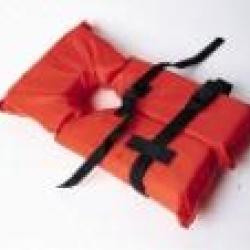Source Institutions
Source Institutions
Add to list Go to activity
Activity link broken? See if it's at the internet archive

In this activity, learners explore the engineering behind life vests or personal flotation devices and the challenges met by these devices. Learners work in teams to design and build a flotation device out of everyday materials that can keep an unopened can of soup or vegetables afloat in a bucket of water or sink for a minute. They design their life vest, build and test it, evaluate their designs and those of other learners, and share observations with the group.
- Under 5 minutes
- 1 to 2 hours
- $10 - $20 per group of students
- Ages 8 - 14
- Activity, Experiment/Lab Activity, Lesson/Lesson Plan
- English
Quick Guide
Materials List (per group of students)
- Student Resource Sheets
- Student Worksheets
- Water source, bucket, or sink area
- Soup or vegetable cans
- Paper cups
- Straws
- Paper towels
- Rubber bands
- Paper clips
- Tape
- Balloons
- Plastic bags or lunch bags
- Glue
- Corks
- Foam pieces
- String
- Foil
- Hose or tubes
- Small containers
- Other items as needed
Subjects
-
Engineering and Technology
-
Engineering
- Metallurgy and Materials Engineering
- Technology
-
Engineering
-
Physical Sciences
-
Motion and Forces
- Gravity
- States of Matter
-
Structure and Properties of Matter
- Mass and Weight
- Volume and Density
-
Motion and Forces
-
The Nature of Science
-
The Scientific Process
- Conducting Investigations
- Gathering Data
- Formulating Explanations
- Communicating Results
-
The Scientific Process
-
The Nature of Technology
-
Technology and Society
- Impacts of Technology
-
The Design Process
- Research and Development
- Invention and Innovation
- Problem Solving
- Troubleshooting and Maintenance
-
Technology and Society
Audience
To use this activity, learners need to:
- see
- read
- touch
Learning styles supported:
- Involves teamwork and communication skills
- Uses STEM to solve real-world problems
- Involves hands-on or lab activities
Other
Components that are part of this resource:
Includes alignment to state and/or national standards:
This resource is part of:
Access Rights:
- Free access
By:
Rights:
- All rights reserved, IEEE,
